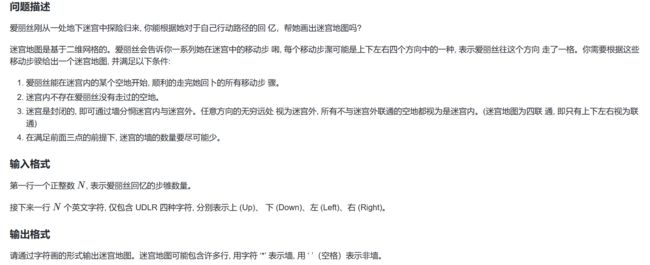- 《投行人生》读书笔记
小蘑菇的树洞
《投行人生》----作者詹姆斯-A-朗德摩根斯坦利副主席40年的职业洞见-很短小精悍的篇幅,比较适合初入职场的新人。第一部分成功的职业生涯需要规划1.情商归为适应能力分享与协作同理心适应能力,更多的是自我意识,你有能力识别自己的情并分辨这些情绪如何影响你的思想和行为。2.对于初入职场的人的建议,细节,截止日期和数据很重要截止日期,一种有效的方法是请老板为你所有的任务进行优先级排序。和老板喝咖啡的好
- 读书||陶新华《教育中的积极心理学》1—28
流水淙淙2022
读一本好书,尤如和一位高尚者对话,亦能对人的精神进行洗礼。但是若不能和实践结合起来,也只能落到空读书的状态。读书摘要与感想1、塞利格曼在《持续的幸福》一书中提出了幸福2.0理论,提出幸福由5个元素决定——积极情绪、投入的工作和生活、目标和意义、和谐的人际关系、成就感。2、人的大脑皮层在进行智力活动时,都伴有皮下中枢活动,对这些活动进行体验请假,并由此产生了情感解读。人的情绪情感体验总是优先于大脑的
- 2024.9.6 Python,华为笔试题总结,字符串格式化,字符串操作,广度优先搜索解决公司组织绩效互评问题,无向图
RaidenQ
python华为leetcode算法力扣广度优先无向图
1.字符串格式化name="Alice"age=30formatted_string="Name:{},Age:{}".format(name,age)print(formatted_string)或者name="Alice"age=30formatted_string=f"Name:{name},Age:{age}"print(formatted_string)2.网络健康检查第一行有两个整数m
- 崩坏星穹铁道哪个角色值得培养 崩坏星穹铁道新手角色优先级教学
会飞滴鱼儿
崩坏星穹铁道新手角色培养攻略:哪些角色值得投资?在《崩坏星穹铁道》中,角色的强度和培养一直是玩家们关心的焦点。要想体验更爽快的游戏过程,选对角色至关重要。那么,哪些角色值得投资培养呢?本篇教学文章将针对新手玩家,从T0到T1强度的角色中为你做出详尽解析。游戏豹官网现在的手游平台很多,但是在游戏界有这么一个传说:“喜欢肝的玩家不如氪金玩家,氪金玩家不如内部福利玩家”,这就是游戏界可悲的生物链,很多平
- C++常见知识掌握
nfgo
c++开发语言
1.Linux软件开发、调试与维护内核与系统结构Linux内核是操作系统的核心,负责管理硬件资源,提供系统服务,它是系统软件与硬件之间的桥梁。主要组成部分包括:进程管理:内核通过调度器分配CPU时间给各个进程,实现进程的创建、调度、终止等操作。使用进程描述符(task_struct)来存储进程信息,包括状态(就绪、运行、阻塞等)、优先级、内存映射等。内存管理:包括物理内存和虚拟内存管理。通过页表映
- python实现规则引擎_规则引擎python
weixin_39601511
python实现规则引擎
广告关闭回望2020,你在技术之路上,有什么收获和成长么?对于未来,你有什么期待么?云+社区年度征文,各种定制好礼等你!我正在用python编写日志收集分析应用程序,我需要编写一个“规则引擎”来匹配和处理日志消息。它需要具有以下特点:正则表达式匹配消息本身消息严重性优先级的算术比较布尔运算符我设想一个例子规则可能是这样的:(message~program:messageandseverity>=h
- Regular Expression 正则表达式
Aimyon_36
DataDevelopment正则表达式redis数据库
RegularExpression前言1.基本匹配2.元字符2.1点运算符.2.2字符集2.2.1否定字符集2.3重复次数2.3.1*号2.3.2+号2.3.3?号2.4{}号2.5(...)特征标群2.6|或运算符2.7转码特殊字符2.8锚点2.8.1^号2.8.2$号3.简写字符集4.零宽度断言(前后预查)4.1?=...正先行断言4.2?!...负先行断言4.3?Thefatcatsaton
- Leetcode 3286. Find a Safe Walk Through a Grid
Espresso Macchiato
leetcode笔记leetcode3286leetcodemeidumleetcode双周赛139bfs最优路径
Leetcode3286.FindaSafeWalkThroughaGrid1.解题思路2.代码实现题目链接:3286.FindaSafeWalkThroughaGrid1.解题思路这一题的话思路上就是一个宽度优先遍历,我们按照health进行排序进行宽度优先遍历,看看在health被消耗完之前是否可能走到终点即可。2.代码实现给出python代码实现如下:classSolution:deffin
- css设置当字数超过限制后以省略号(...)显示
周bro
css前端vuecss3html经验分享
1、文字超出一行,省略超出部分,显示’…’用text-overflow:ellipsis属性来,当然还需要加宽度width属来兼容部分浏览。overflow:hidden;text-overflow:ellipsis;white-space:nowrap;2、多行文本溢出显示省略号display:-webkit-box;-webkit-box-orient:vertical;-webkit-lin
- 《算法》四学习——1.1节
进阶的Farmer
算法算法笔记
前言买了一本算法4,每天看一点,对每个小结来个学习总结,输出驱动输入。本篇笔记针对第一章基础1.1基础编程模型1.1节总结了相关的语法、语言特性和书中将会用到的库。笔记自己在编码中容易遗漏的点&&优先级比||高在开发中习惯了加括号,所以没注意到这点,教材上也有但是忘记了二分查找中计算mid=left+(right-left)/2这样计算可以有效避免(left+right)/2溢出答疑java无穷大
- 前端CSS面试常见题
剑亦未配妥
前端面试前端css面试
边界塌陷盒模型有两种:W3C盒模型和IE盒模型,区别在于宽度是否包含边框定义:同时给兄弟/父子盒模型设置上下边距,理论上边距值是两者之和,实际上不是注意:浮动和定位不会产生边界塌陷;只有块级元素垂直方向才会产生margin合并margin计算方案margin同为正负:取绝对值大的值一正一负:求和父子元素边界塌陷解决父元素可以通过调整padding处理;设置overflowhidden,触发BFC子
- 15-自编写rtos-结合stm32实际调试(ladylolo-os)
Ladylolo-lsm
stm32嵌入式硬件单片机
一、任务调度:1.理解:任务切换,用堆栈指针SP保存即将要切换的任务的前后文,然后是用PendSV来执行这些操作的;由于是基于优先级的调度策略,所以每次“心跳”都会看有没有优先级更高的出现,如果有就用PendSV进行上下文切换。2.编写部分:①每个任务自己的属性统称为TCB任务控制块。②任务就绪表有设置优先级(设置的时候变量或上优先级的变量让某个位数等于1),从任务就绪表中删除(删除时用与来得等于
- 计算机视觉中,Pooling的作用
Wils0nEdwards
计算机视觉人工智能
在计算机视觉中,Pooling(池化)是一种常见的操作,主要用于卷积神经网络(CNN)中。它通过对特征图进行下采样,减少数据的空间维度,同时保留重要的特征信息。Pooling的作用可以归纳为以下几个方面:1.降低计算复杂度与内存需求Pooling操作通过对特征图进行下采样,减少了特征图的空间分辨率(例如,高度和宽度)。这意味着网络需要处理的数据量会减少,从而降低了计算量和内存需求。这对大型神经网络
- LCR 078. 合并 K 个升序链表
装B且挨揍の
LeetCode链表算法数据结构经验分享笔记java
https://leetcode.cn/problems/vvXgSW/description/https://leetcode.cn/problems/vvXgSW/description/解题思路方法一:每个链表维护一个索引,每次找到值最小的节点,索引加一。可以采用优先队列实现。/***Definitionforsingly-linkedlist.*publicclassListNode{*i
- 蓝桥杯18小白第5题
@liu666
蓝桥杯算法职场和发展
思维,#includeusingnamespacestd;#defineintlonglongconstintn=1e6+11;inta,b[n],c[n],d,k[n];structs{intx,y,z;}q[n];boolcmp(sa1,sa2){returna1.z>a;for(inti=1;i>q[i].x;}for(inti=1;i>q[i].y;q[i].z=q[i].x+q[i].y
- 【LeetCode 算法笔记】84. 柱状图中最大的矩形
Sardar_
算法leetcode笔记
目录问题描述暴力求解:栈问题描述给定n个非负整数,用来表示柱状图中各个柱子的高度。每个柱子彼此相邻,且宽度为1。求在该柱状图中,能够勾勒出来的矩形的最大面积。示例1:输入:heights=[2,1,5,6,2,3]输出:10解释:最大的矩形为图中红色区域,面积为10示例2:输入:heights=[2,4]输出:4提示:1int:area=0n=len(heights)foriinrange(n):
- 5月9日,十二星座,星座运势
葫芦姐姐聊星座
白羊座:活跃度有待提高,你得合理安排好既定行程,而不是让事情处在相互拉扯推委的状态,这会让你的可信度大打折扣,他人也会觉得你有些不可理喻;感情上缺乏信任度,对很多事都抱着怀疑的态度对待。金牛座:宜收敛好奇心,你要在社交场合显得更加稳重,别一有什么风吹草动就自乱阵脚,或是想着什么大事要发生,建议优先完成自己手上的任务;感情上相互质疑,有什么误会及时沟通,都不说会让误会加深。双子座:情绪平和,你能在一
- Xilinx 7系列FPGA架构之器件配置(二)
FPGA技术实战
FPGA器件架构XinxFPGA硬件设计fpga开发
引言:本文我们介绍下7系列FPGA的配置接口,在进行硬件电路图设计时,这也是我们非常关心的内容,本文主要介绍配置模式的选择、配置管脚定义以及如何选择CFGBVS管脚电压及Bank14/15电压。1.概述Xilinx®7系列设备有五个配置接口。每个配置接口对应一个或多个配置模式和总线宽度,如表1所示。有关接口详细的时序信息,可以参阅相应的7系列FPGA数据手册。配置时序主要与FPGA配置时钟管脚CC
- 图片中的上采样,下采样和通道融合(up-sample, down-sample, channel confusion)
迪三
#图像处理_PyTorch计算机视觉深度学习人工智能
前言以conv2d为例(即图片),Pytorch中输入的数据格式为tensor,格式为:[N,C,W,H,W]第一维N.代表图片个数,类似一个batch里面有N张图片第二维C.代表通道数,在模型中输入如果为彩色,常用RGB三色图,那么就是3维,即C=3。如果是黑白的,即灰度图,那么只有一个通道,即C=1第三维H.代表图片的高度,H的数量是图片像素的列数第四维W.代表图片的宽度,W的数量是图片像素的
- 测试用例设计方法
胖球的铲屎官
测试用例
一、什么是测试用例?测试用例主要是测试人员整理的一组文档,具体记录软件功能测试的输入和预期输出,描述测试场景。二、测试用例包含哪些内容包括用例编号、测试模块,用例名称、前置条件、优先级、测试步骤、预期结果,实际结果,执行人,测试时间,备注。三、测试用例设计方法可以从以下4个大方面去考虑:1、功能功能可以从黑盒测试和白盒测试考虑;1-1黑盒测试从黑盒测试看,可以用等价类划分法,边界值分析,错误推测,
- OpenGL之基础纹理一
我的大好时光
先看下效果图:纹理效果图.pngDemo下载地址:点击下载一、像素图像的数据包装图像存储空间=图像width*图像height*每个像素的字节数ps:有一张RGB的图像(每个颜色通道8位),图像的宽度199个像素,每行需要存储多少空间?解:8位为一个字节,有三个颜色,所以一个RGB需要3个字节存储。199(width)*1(height)*3(字节)二、像素的存储方式/**@parampname:
- js进阶第二天
LIT乐言
一、水平滚动条和垂直滚动条Snip20161124_1.png1.1核心技术点1)求滚动条的长度?2)拖动滚动条,求内容要走多少?滚动条的长度取决于滚动内容(滚动内容越长,滚动条越短);内容滚动的距离和滚动条走的距离是成倍数关系。1.2换算公式获取滚动条的长度:**滚动条的长度/盒子的长度=盒子的长度/内容的长度**滚动条长度=(盒子的宽度/内容的宽度)*盒子的宽度拖动滚动条,求内容走的长度:**
- 美国专利申请常用加快审查程序
察尔斯格伦
美国专利商标局(USPTO)针对专利申请人的不同需求开展了多种方式的加快审查。今天我们来聊一聊更为常用的专利申请高速公路(PatentProsecutionHighway,PPH)和优先审查(PrioritizedExamination,TrackOne)程序。一、专利申请高速公路(PPH)专利申请高速公路是适用于不同国家的知识产权局之间的加速审查通道,其根据是美国参与的双边和多边协议。根据专利申
- 8.12复盘
凤二爷
今日最重要的事:1.看拖延大师在想什么的感悟总结2了解白糖、面粉、油的行情3打扫卫生4看书是否冥冥之中有感应啊,我在写拖延症感悟这一课拖延了,而一大早就看到写作营知一的作业,她把拖延症写的好痛啊!她的1+1+1法值得推广1个念头:先做5分钟1个工具:番茄钟1个列表:按照pdca闭环列出所有计划中,进行中,按优先级排序,并做设计,检查,修正今日复盘:没写完拖延症感悟。没了解油糖行情反思:拖延症真的有
- 白话PM——产品组合管理
樂樂啊
Q:您能说说当前新产品开发面临的挑战吗?A:当然,目前的挑战可以说四方面:1、新产品开发与企业战略脱节2、过多的项目同时开发3、缺乏有效的任务优先级管理4、资源配置没有随着项目优先级的不断变化进行动态调整Q:感谢,总结的很到位,那您能说说什么是产品组合呢?A:这个我没法下结论,但肯尼斯·卡恩说:“一个组织正在投资的并将对其做出战略性权衡取舍的一系列项目或产品。“即为产品组合的定义。贝利维尔说:”企
- vue 表格左右拖拽调整列宽_vue中实现拖动调整左右两侧div的宽度的示例代码
weixin_40008969
vue表格左右拖拽调整列宽
写在最前最近在使用vue的时候,遇到一个需求,实现左右div可通过中间部分拖拽调整宽度,类似于这样这是我最终的实现效果还是老话,因为我不是专业的前端工程师,只是兼职写一些简单的前端,所以这个功能的实现得益于以下博客,《vue拖动调整左右两侧div的宽度》、《vuejs中拖动改变元素宽度实现宽度自适应大小》,而我只是针对于他们提供的代码,加了亿点点自己所需要的细节。实现原理如上图所示,我们需要将要实
- 选择适合你企业发展的服务器
666IDCaaa
服务器运维
1.我的服务器的主要目的是什么?主要是用于电子邮件目的?还是认为数据传输更重要?当然,选择多功能的服务器是最佳的,这样你就不必只将其用于一个目的而已。你需要了解哪些操作和功能有利于你目前业务需求的发展,根据优先级去选择,选择和你业务需求相匹配度更高的服务器。一般来说,选择服务器之前,还要确定好将运行什么软件,负载有多大,这样就可以很清楚的知道服务器的大概配置,cpu、内存、硬盘等分别用怎样的最好。
- 清醒文案丨优先考虑那个优先考虑你的人。
晚藏温柔屿
1.优先考虑那个优先考虑你的人。2.不要因为说了你想听的你就信了。3.一直停在原地,麻的不是腿脚是脑子。4.过去的事情唯一可爱之处就在于它已经过去。5.一个人的时间用在什么地方是看得见的。6.做你害怕做的事情,然后你会发现,不过如此。7.有时候你以为天要塌下来了,其实是自己站歪了。8.生活里有时无论你说的多么谨慎,却总有人曲解你的意思。9.无底线的迎合,只会让自己站在大雾里,连自己都看不清自己。1
- #1045#学习落位原则和方法
张景楠
1.落位原则品牌落位是最终招商实施方案,应当遵循以下原则:一是要符合定位;二是要遵循品类规划;三是可执行,在充分对商业资源进行认真摸底,选择代表品牌全面沟通确认可执行后开展落位;四是要适销,当地成熟、适销性强的品牌优先落位;五是协调性,关注相邻品牌风格要协调,顺畅自然、巧妙过渡。2.落位方法品牌落位时,要对当地商家资源进行摸底,了解清楚项目所在城市的商业体各业态、各品类的业绩排行,掌握业绩好、“接
- 应用光学的几组公式
萌龙在天
在不同的区域,有不同的计算公式。由于需要对大量光线进行计算,所以计算方法的选择就和重要。优先选择可以消除中间量的计算公式。近轴光线追迹所遵循的公式。其次就是几组放大率的公式,转面公式,拉赫不变量。各个光学系统的分辨率,孔径,入瞳,出瞳之间所遵循的公式。计算像差的公式。符号所代表的意义,以及符号与符号间的联系,需要认真的去用笔去写下来,分析和理解。最主要的就是要明白光学系统所规定的符号规则,正确的标
- java封装继承多态等
麦田的设计者
javaeclipsejvmcencapsulatopn
最近一段时间看了很多的视频却忘记总结了,现在只能想到什么写什么了,希望能起到一个回忆巩固的作用。
1、final关键字
译为:最终的
&
- F5与集群的区别
bijian1013
weblogic集群F5
http请求配置不是通过集群,而是F5;集群是weblogic容器的,如果是ejb接口是通过集群。
F5同集群的差别,主要还是会话复制的问题,F5一把是分发http请求用的,因为http都是无状态的服务,无需关注会话问题,类似
- LeetCode[Math] - #7 Reverse Integer
Cwind
java题解MathLeetCodeAlgorithm
原题链接:#7 Reverse Integer
要求:
按位反转输入的数字
例1: 输入 x = 123, 返回 321
例2: 输入 x = -123, 返回 -321
难度:简单
分析:
对于一般情况,首先保存输入数字的符号,然后每次取输入的末位(x%10)作为输出的高位(result = result*10 + x%10)即可。但
- BufferedOutputStream
周凡杨
首先说一下这个大批量,是指有上千万的数据量。
例子:
有一张短信历史表,其数据有上千万条数据,要进行数据备份到文本文件,就是执行如下SQL然后将结果集写入到文件中!
select t.msisd
- linux下模拟按键输入和鼠标
被触发
linux
查看/dev/input/eventX是什么类型的事件, cat /proc/bus/input/devices
设备有着自己特殊的按键键码,我需要将一些标准的按键,比如0-9,X-Z等模拟成标准按键,比如KEY_0,KEY-Z等,所以需要用到按键 模拟,具体方法就是操作/dev/input/event1文件,向它写入个input_event结构体就可以模拟按键的输入了。
linux/in
- ContentProvider初体验
肆无忌惮_
ContentProvider
ContentProvider在安卓开发中非常重要。与Activity,Service,BroadcastReceiver并称安卓组件四大天王。
在android中的作用是用来对外共享数据。因为安卓程序的数据库文件存放在data/data/packagename里面,这里面的文件默认都是私有的,别的程序无法访问。
如果QQ游戏想访问手机QQ的帐号信息一键登录,那么就需要使用内容提供者COnte
- 关于Spring MVC项目(maven)中通过fileupload上传文件
843977358
mybatisspring mvc修改头像上传文件upload
Spring MVC 中通过fileupload上传文件,其中项目使用maven管理。
1.上传文件首先需要的是导入相关支持jar包:commons-fileupload.jar,commons-io.jar
因为我是用的maven管理项目,所以要在pom文件中配置(每个人的jar包位置根据实际情况定)
<!-- 文件上传 start by zhangyd-c --&g
- 使用svnkit api,纯java操作svn,实现svn提交,更新等操作
aigo
svnkit
原文:http://blog.csdn.net/hardwin/article/details/7963318
import java.io.File;
import org.apache.log4j.Logger;
import org.tmatesoft.svn.core.SVNCommitInfo;
import org.tmateso
- 对比浏览器,casperjs,httpclient的Header信息
alleni123
爬虫crawlerheader
@Override
protected void doGet(HttpServletRequest req, HttpServletResponse res) throws ServletException, IOException
{
String type=req.getParameter("type");
Enumeration es=re
- java.io操作 DataInputStream和DataOutputStream基本数据流
百合不是茶
java流
1,java中如果不保存整个对象,只保存类中的属性,那么我们可以使用本篇文章中的方法,如果要保存整个对象 先将类实例化 后面的文章将详细写到
2,DataInputStream 是java.io包中一个数据输入流允许应用程序以与机器无关方式从底层输入流中读取基本 Java 数据类型。应用程序可以使用数据输出流写入稍后由数据输入流读取的数据。
- 车辆保险理赔案例
bijian1013
车险
理赔案例:
一货运车,运输公司为车辆购买了机动车商业险和交强险,也买了安全生产责任险,运输一车烟花爆竹,在行驶途中发生爆炸,出现车毁、货损、司机亡、炸死一路人、炸毁一间民宅等惨剧,针对这几种情况,该如何赔付。
赔付建议和方案:
客户所买交强险在这里不起作用,因为交强险的赔付前提是:“机动车发生道路交通意外事故”;
如果是交通意外事故引发的爆炸,则优先适用交强险条款进行赔付,不足的部分由商业
- 学习Spring必学的Java基础知识(5)—注解
bijian1013
javaspring
文章来源:http://www.iteye.com/topic/1123823,整理在我的博客有两个目的:一个是原文确实很不错,通俗易懂,督促自已将博主的这一系列关于Spring文章都学完;另一个原因是为免原文被博主删除,在此记录,方便以后查找阅读。
有必要对
- 【Struts2一】Struts2 Hello World
bit1129
Hello world
Struts2 Hello World应用的基本步骤
创建Struts2的Hello World应用,包括如下几步:
1.配置web.xml
2.创建Action
3.创建struts.xml,配置Action
4.启动web server,通过浏览器访问
配置web.xml
<?xml version="1.0" encoding="
- 【Avro二】Avro RPC框架
bit1129
rpc
1. Avro RPC简介 1.1. RPC
RPC逻辑上分为二层,一是传输层,负责网络通信;二是协议层,将数据按照一定协议格式打包和解包
从序列化方式来看,Apache Thrift 和Google的Protocol Buffers和Avro应该是属于同一个级别的框架,都能跨语言,性能优秀,数据精简,但是Avro的动态模式(不用生成代码,而且性能很好)这个特点让人非常喜欢,比较适合R
- lua set get cookie
ronin47
lua cookie
lua:
local access_token = ngx.var.cookie_SGAccessToken
if access_token then
ngx.header["Set-Cookie"] = "SGAccessToken="..access_token.."; path=/;Max-Age=3000"
end
- java-打印不大于N的质数
bylijinnan
java
public class PrimeNumber {
/**
* 寻找不大于N的质数
*/
public static void main(String[] args) {
int n=100;
PrimeNumber pn=new PrimeNumber();
pn.printPrimeNumber(n);
System.out.print
- Spring源码学习-PropertyPlaceholderHelper
bylijinnan
javaspring
今天在看Spring 3.0.0.RELEASE的源码,发现PropertyPlaceholderHelper的一个bug
当时觉得奇怪,上网一搜,果然是个bug,不过早就有人发现了,且已经修复:
详见:
http://forum.spring.io/forum/spring-projects/container/88107-propertyplaceholderhelper-bug
- [逻辑与拓扑]布尔逻辑与拓扑结构的结合会产生什么?
comsci
拓扑
如果我们已经在一个工作流的节点中嵌入了可以进行逻辑推理的代码,那么成百上千个这样的节点如果组成一个拓扑网络,而这个网络是可以自动遍历的,非线性的拓扑计算模型和节点内部的布尔逻辑处理的结合,会产生什么样的结果呢?
是否可以形成一种新的模糊语言识别和处理模型呢? 大家有兴趣可以试试,用软件搞这些有个好处,就是花钱比较少,就算不成
- ITEYE 都换百度推广了
cuisuqiang
GoogleAdSense百度推广广告外快
以前ITEYE的广告都是谷歌的Google AdSense,现在都换成百度推广了。
为什么个人博客设置里面还是Google AdSense呢?
都知道Google AdSense不好申请,这在ITEYE上也不是讨论了一两天了,强烈建议ITEYE换掉Google AdSense。至少,用一个好申请的吧。
什么时候能从ITEYE上来点外快,哪怕少点
- 新浪微博技术架构分析
dalan_123
新浪微博架构
新浪微博在短短一年时间内从零发展到五千万用户,我们的基层架构也发展了几个版本。第一版就是是非常快的,我们可以非常快的实现我们的模块。我们看一下技术特点,微博这个产品从架构上来分析,它需要解决的是发表和订阅的问题。我们第一版采用的是推的消息模式,假如说我们一个明星用户他有10万个粉丝,那就是说用户发表一条微博的时候,我们把这个微博消息攒成10万份,这样就是很简单了,第一版的架构实际上就是这两行字。第
- 玩转ARP攻击
dcj3sjt126com
r
我写这片文章只是想让你明白深刻理解某一协议的好处。高手免看。如果有人利用这片文章所做的一切事情,盖不负责。 网上关于ARP的资料已经很多了,就不用我都说了。 用某一位高手的话来说,“我们能做的事情很多,唯一受限制的是我们的创造力和想象力”。 ARP也是如此。 以下讨论的机子有 一个要攻击的机子:10.5.4.178 硬件地址:52:54:4C:98
- PHP编码规范
dcj3sjt126com
编码规范
一、文件格式
1. 对于只含有 php 代码的文件,我们将在文件结尾处忽略掉 "?>" 。这是为了防止多余的空格或者其它字符影响到代码。例如:<?php$foo = 'foo';2. 缩进应该能够反映出代码的逻辑结果,尽量使用四个空格,禁止使用制表符TAB,因为这样能够保证有跨客户端编程器软件的灵活性。例
- linux 脱机管理(nohup)
eksliang
linux nohupnohup
脱机管理 nohup
转载请出自出处:http://eksliang.iteye.com/blog/2166699
nohup可以让你在脱机或者注销系统后,还能够让工作继续进行。他的语法如下
nohup [命令与参数] --在终端机前台工作
nohup [命令与参数] & --在终端机后台工作
但是这个命令需要注意的是,nohup并不支持bash的内置命令,所
- BusinessObjects Enterprise Java SDK
greemranqq
javaBOSAPCrystal Reports
最近项目用到oracle_ADF 从SAP/BO 上调用 水晶报表,资料比较少,我做一个简单的分享,给和我一样的新手 提供更多的便利。
首先,我是尝试用JAVA JSP 去访问的。
官方API:http://devlibrary.businessobjects.com/BusinessObjectsxi/en/en/BOE_SDK/boesdk_ja
- 系统负载剧变下的管控策略
iamzhongyong
高并发
假如目前的系统有100台机器,能够支撑每天1亿的点击量(这个就简单比喻一下),然后系统流量剧变了要,我如何应对,系统有那些策略可以处理,这里总结了一下之前的一些做法。
1、水平扩展
这个最容易理解,加机器,这样的话对于系统刚刚开始的伸缩性设计要求比较高,能够非常灵活的添加机器,来应对流量的变化。
2、系统分组
假如系统服务的业务不同,有优先级高的,有优先级低的,那就让不同的业务调用提前分组
- BitTorrent DHT 协议中文翻译
justjavac
bit
前言
做了一个磁力链接和BT种子的搜索引擎 {Magnet & Torrent},因此把 DHT 协议重新看了一遍。
BEP: 5Title: DHT ProtocolVersion: 3dec52cb3ae103ce22358e3894b31cad47a6f22bLast-Modified: Tue Apr 2 16:51:45 2013 -070
- Ubuntu下Java环境的搭建
macroli
java工作ubuntu
配置命令:
$sudo apt-get install ubuntu-restricted-extras
再运行如下命令:
$sudo apt-get install sun-java6-jdk
待安装完毕后选择默认Java.
$sudo update- alternatives --config java
安装过程提示选择,输入“2”即可,然后按回车键确定。
- js字符串转日期(兼容IE所有版本)
qiaolevip
TODateStringIE
/**
* 字符串转时间(yyyy-MM-dd HH:mm:ss)
* result (分钟)
*/
stringToDate : function(fDate){
var fullDate = fDate.split(" ")[0].split("-");
var fullTime = fDate.split("
- 【数据挖掘学习】关联规则算法Apriori的学习与SQL简单实现购物篮分析
superlxw1234
sql数据挖掘关联规则
关联规则挖掘用于寻找给定数据集中项之间的有趣的关联或相关关系。
关联规则揭示了数据项间的未知的依赖关系,根据所挖掘的关联关系,可以从一个数据对象的信息来推断另一个数据对象的信息。
例如购物篮分析。牛奶 ⇒ 面包 [支持度:3%,置信度:40%] 支持度3%:意味3%顾客同时购买牛奶和面包。 置信度40%:意味购买牛奶的顾客40%也购买面包。 规则的支持度和置信度是两个规则兴
- Spring 5.0 的系统需求,期待你的反馈
wiselyman
spring
Spring 5.0将在2016年发布。Spring5.0将支持JDK 9。
Spring 5.0的特性计划还在工作中,请保持关注,所以作者希望从使用者得到关于Spring 5.0系统需求方面的反馈。

